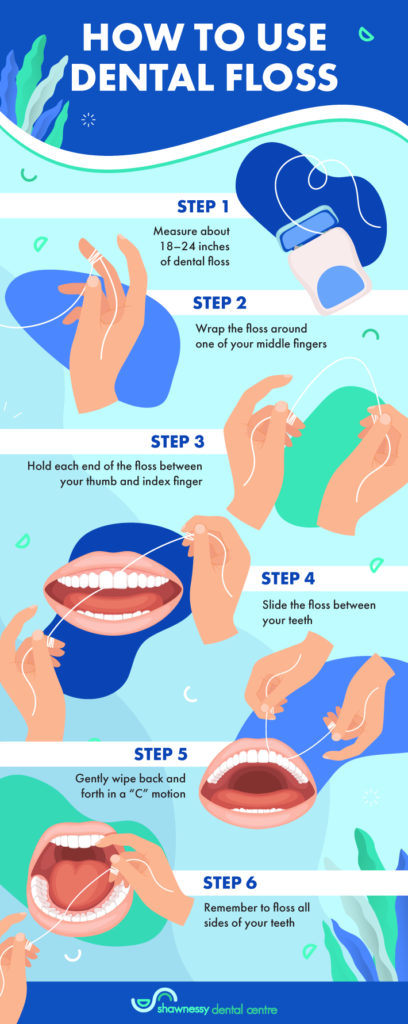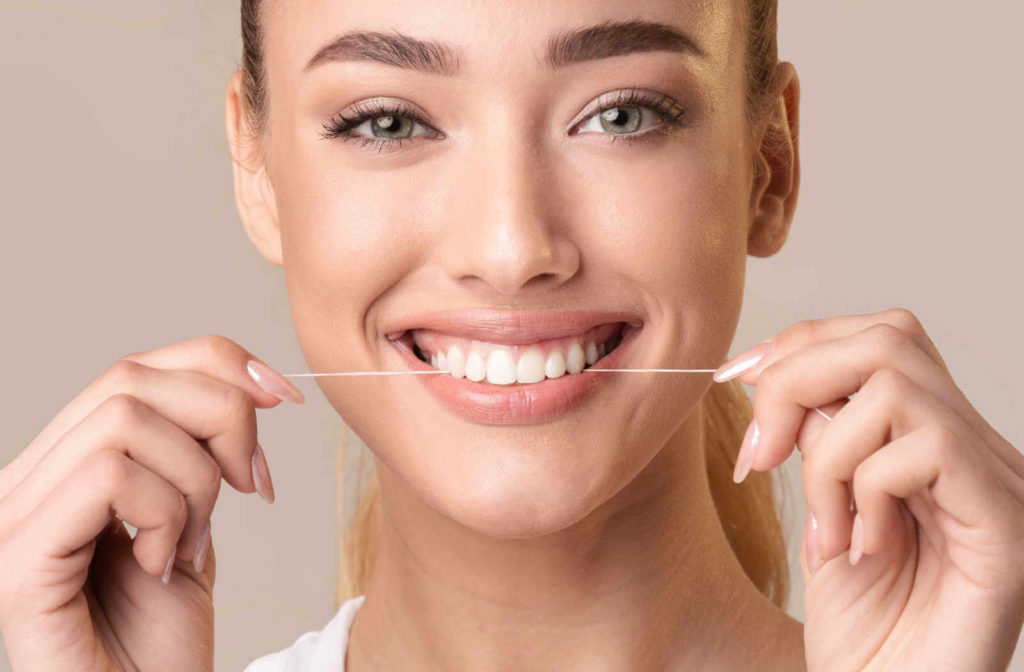Flossing is an essential part of your oral health routine. The Canadian Dental Association recommends flossing your teeth at least once a day. Beyond following recommended flossing frequency, understanding why flossing is such a crucial part of your oral care can help you when it comes to remembering to do it!
Let’s go over the importance of flossing, how to do it properly, and how it fits into your oral health routine so you can make the most of your at-home oral care.
Why is Flossing Important?
Flossing is crucial for reducing your risk of developing tooth decay and gum disease. Floss does this by getting in the hard-to-reach areas your toothbrush doesn’t.
Tooth decay occurs when plaque forms on the tooth surface due to excess sugars and starches not being cleaned off your teeth. Plaque creates a transparent film that coats your teeth, which can eventually harden into tartar.
Acids in plaque eat away at the hard outer layer of your teeth, called the enamel. As the enamel erodes, it can expose the inner layers of your teeth, like dentin, nerves, and blood vessels. This exposure can be painful.
Flossing is an extra step you can take to remove food waste from between your teeth. That food waste is what leaves sugar and starch residue that travels through your mouth when it mixes with your saliva.

How Should You Floss?
Correct flossing technique removes food waste and protects your teeth from decay. Flossing correctly can also reduce your risk of damaging your gums, causing bleeding and pain. The essential steps of flossing include:
- Start by breaking off about 2 feet of floss.
- Wind the majority of that floss around one of your middle fingers
- Hold the floss taught between each thumb and index finger
- Slide the floss between your teeth and wipe back and forth in a “C” shape
- Floss both sides of every tooth from front to back
When you first begin flossing, you might experience some bleeding. This bleeding should subside after the first few times you floss; however, it’s crucial to follow the proper technique to avoid cutting your gums.
How Else Do You Take Care of Your Teeth?
Flossing is just one part of your overall daily oral health care. Developing an oral health routine you can follow regularly is crucial to maintaining your dental health.
Brushing
Brushing thoroughly is another essential part of preventing tooth decay. Like flossing, brushing removes bacteria, food waste, and plaque buildup on the tooth surface to keep your teeth and gums healthy and your smile bright.
Use a gentle, circular motion when brushing. Don’t scrub. Brush at a 45-degree angle and ensure you get all sides of your tooth to clean the tooth and get rid of any debris effectively. Use toothpaste with a fluoride ingredient to effectively clean your teeth.
Mouthwash
Mouthwash is often used to fight bad breath and eliminate excess bacteria in the mouth. However, mouthwash should never replace regular brushing and flossing because mouthwash doesn’t wash away plaque on the teeth.
Use a small amount of mouthwash, between 3–5 teaspoons, and rinse your mouth for 30 seconds. Many mouthwash products recommend using them twice a day after brushing and flossing.
Regular Dental Visits
Regular visits with the dentist are crucial to taking care of your teeth. During your visit, your dentist will check your teeth for any signs of tooth decay or cavities and examine your gum health for signs of disease.
The Canadian Dental Association recommends scheduling a dental exam every 6 months.
Get the Oral Care Advice You Need
Flossing has many benefits for preserving your oral health. Your dentist can recommend flossing and other oral health tips like brushing your teeth to prevent tooth decay and gum disease while reducing your risk of infection.Get in touch with your dentist and book an appointment so they can give you the oral health tips you need to take care of your teeth, gums, and mouth.



